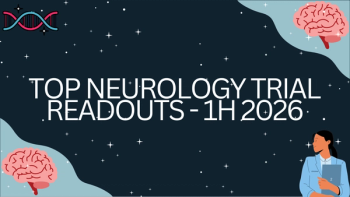
Movement Disorders
Latest News

Video Series

Latest Videos
Shorts










Podcasts
CME Content
More News

The FDA raised no objections to Lexicon Pharmaceuticals’ pilavapadin for a phase 3 program, which will include 2-arm registrational studies, in patients with diabetic peripheral neuropathic pain.

Head-to-head PET imaging data indicated that valbenazine achieves significantly higher VMAT2 target occupancy than deutetrabenazine XR at therapeutic doses, with both treatments remaining well tolerated.

A phase 2a trial showed that NLX-112 was safe and well tolerated in patients with Parkinson disease, while also reducing levodopa-induced dyskinesia and motor symptoms, supporting further clinical development.

IntraBio reported that levacetylleucine showed symptom improvement in the phase 3 IB1001-303 study for ataxia-telangiectasia, and it intends to proceed with regulatory submissions in multiple regions.

The chief medical officer at the Parkinson’s Foundation detailed how mood and behavioral symptoms shape quality of life in Parkinson disease and how clinicians can better identify and manage them.

A five-year analysis from the National RLS Opioid Registry found that most patients with dopamine agonist augmented restless legs syndrome maintained stable, low-dose opioid therapy with sustained symptom control.

Early initiation of opicapone significantly reduces OFF time and enhances ON time in patients with recently diagnosed Parkinson's disease, improving overall treatment outcomes.

A recent phase 2b study reveals mesdopetam's potential in reducing dyskinesia severity in Parkinson disease, despite no significant ON time improvement.

Use of immediate-release amantadine as an add-on to levodopa reduced peak-dose dyskinesia incidence in patients with early Parkinson disease, according to results from the phase 2 PREMANDYSK trial.

The director of Cleveland Clinic's Gamme Knife Center and Head Section of Spine Tumors writes about how stereotactic radiosurgery has transformed modern neurology and neurosurgery

Review upcoming clinical trials with data readouts expected in the first half of 2026, providing updates relevant to ongoing research and clinical practice in neurology.

Follow NeurologyLive's conference journey in 2026, highlighting advancements in diagnostics, treatments, and multidisciplinary care across multiple neurological conditions.

As part of NeurologyLive®'s Year in Review, take a look at some of the top ongoing clinical trials in Parkinson disease that may impact care.

Explore anticipated FDA decisions on groundbreaking neurology drugs in 2026, shaping treatment options for various neurologic conditions.

Margaret Rice, PhD, a professor in the Departments of Neurosurgery and Neuroscience at NYU Grossman School of Medicine, provided answers on recently published preclinical research relating aerobic exercise to dopamine release and coordination in PD.

As part of NeurologyLive®'s Year in Review, take a look at our top expert interviews on the latest advances and use of artificial intelligence in neurology care.

As part of NeurologyLive®'s Year in Review, take a look at our top collaborative interviews with the Strategic Alliance Partnership program in 2025.

These were the most impactful FDA approval stories that were part of our coverage in 2025, brought to you as part of NeurologyLive's Year in Review.

Here's some of what is coming soon to NeurologyLive® this week.

As part of NeurologyLive®'s Year in Review 2025, we've compiled the most-listened episodes this year of our biweekly podcast, Mind Moments®.

Explore the transformative buzzwords in neurology for 2025, highlighting advancements in AI, gene therapy, personalized treatment, and neuroplasticity.

Brain-Penetrant Molecule GT-02287 Demonstrates Reversal of Glucosylsphinogosine in Parkinson Disease
Gain Therapeutics advances Parkinson's treatment with GT 2287, showcasing promising safety and tolerability in ongoing trials. Discover the latest findings.

Here's some of what is coming soon to NeurologyLive® this week.

GLP-1 research in neurology is on the rise, with several pivotal studies lending insights into their role.

Andy Berkowski, MD, PhD, certified sleep neurologist and author of the RLS guidelines, spoke about the clinical impact of the recently published restless syndrome guidelines.























